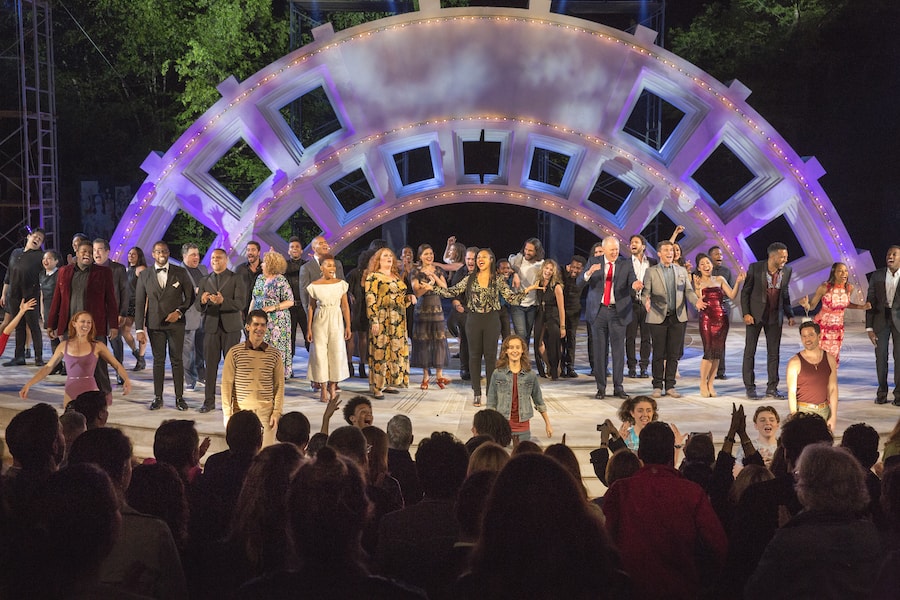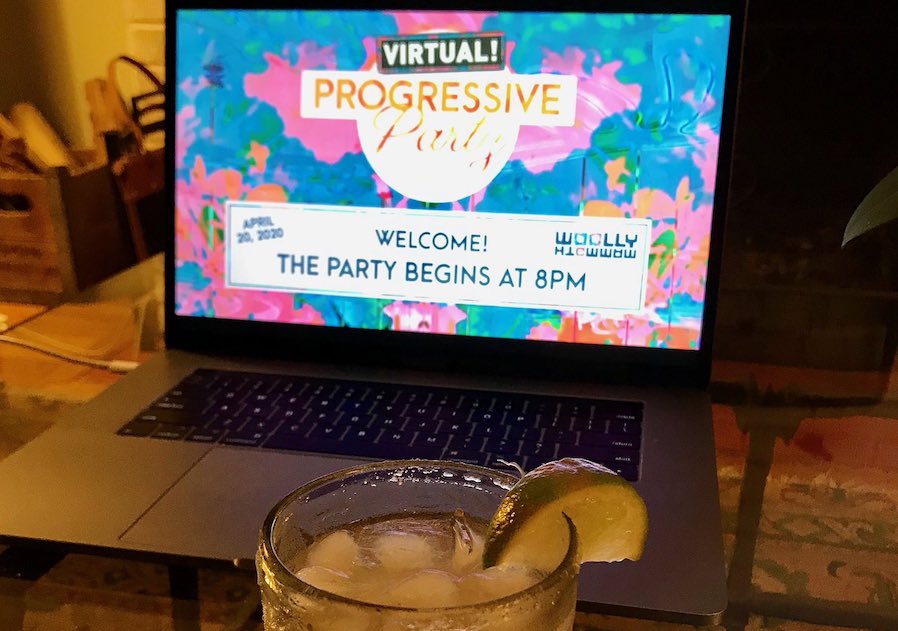Last Monday, April 20, a bartender welcomed attendees to Woolly Mammoth Theatre Company’s annual gala with a pre-show cocktail hour, complete with demonstrations on how to craft a margarita, a boozeless rickey, and a spiced tea old fashioned. This was all, of course, via Zoom. The previous weekend, patrons of California’s Berkeley Repertory Theatre, clad in gala attire, tuned in from home to watch a series of heartening testimonials to the theatre. And last Friday A Noise Within Theatre in Pasadena, Calif., presented at-home performances from its cancelled production of Alice in Wonderland as viewers whipped up their own Wonderland-inspired fare from kitchens across the country.
As the uncertainty around the COVID-19 pandemic continues to thwart spring programming, preemptively ending 2020-21 seasons at theatre companies nationwide, there’s one annual event that can’t be pushed to next calendar year: the gala. These fundraising events buoy operations, leverage community support, and celebrate the theatre community—and with many staffers on furlough, and operations grinding to a halt, fundraising efforts (and a boost of morale) can be more important than ever. And while there’s some debate over how well stage productions translate to the screen, theatres are proving that virtual galas do just fine online. Fundraising goals are being met, even surpassed, with attendance tripled in some cases.
Berkeley Rep decided to pivot its gala plans six weeks before the slated event. “In late February, when we were seeing what was coming down the pike, we started evaluating what to do with the gala,” said Lynn Eve Komaromi, director of development. At that point the gala had already brought in $400,000 in advance ticket and table sales, a bit less than half its total fundraising target. So the gala planning team built a webpage dedicated to the Ovation Gala, featuring videos of artists sharing testimonials for the company, and a month-long online campaign was capped with a special live event honoring Anna Deavere Smith. “This virtual event really became a thank you to anybody who contributed over the course of the month,” said Komaromi, noting that the theatre exceeded its overall goal of $900,000 by $40,000. “We really wanted to focus this on inviting our entire community into a virtual ballroom.”
A virtual ballroom, of course, has a much larger capacity than the Ritz-Carlton ballroom, where Berkeley Rep’s annual gala usually takes place. “What was beautiful about the livestream was that it allowed us to reach a much broader audience,” said Komaromi. “It was wonderful that there were people from across the country tuning in and supporting Berkeley Rep from afar.” The total viewers were more than double the usual number, in large part due to the free virtual tickets—access to the live Ritz-Carlton event would have cost $750 a pop.
Woolly Mammoth also saw a swell in attendance with free tickets to its gala, which was titled the Progressive Party. The company’s live event, which was streamed on YouTube and Facebook Live, had 650 viewers, up from the usual 200 attendees. (The posted videos have now had more than 2,000 views.) In writing the script for the event, the gala organizers strove to make the program accessible.
“We wanted to make sure it was a fun night for people who are our biggest fans that know us really well, but also include points of entry for folks who’ve never heard about us,” said Woolly managing director Emika Abe. A segment on the history of the theatre company and a guessing game about how the theatre got its name was a hit with both Woolly patrons and newbies.
Collaborating over Google Docs, the Woolly artistic, marketing, and development teams moved the party online with help from an outside event planning service in just five weeks. The live event, which was just over an hour in length, featured Abe and artistic director Maria Manuela Goyanes in the theatre’s lobby—standing six feet apart—plus musical performances, and a history lesson on how the theatre in fact got its name. Viewers could share comments throughout the livestreamed program. As initial plans for the in-person gala had included cocktails, hors d’oeuvres, and dinner at eateries in Woolly’s neighborhood, the online auction included gift certificates to these restaurants.
Food was also central to A Noise Within’s initial gala plans. The original run-of-show was for attendees to sit onstage, on the set of Alice in Wonderland, and eat a multi-course catered meal. Instead the theatre put together recipes inspired by the show, including “I’m Late for a Very Important (Bacon-Wrapped) Date” and “King of Hearts’ Berry Tarts,” and attendees were encouraged to share photos of their culinary creations. The company also created a “virtual lobby” on its website for people to post photos in their gala attire for a best-dressed competition.
“We are really trying to encourage our guests to interact with us and interact with each other to give some sense that we’re still experiencing this event together, even though we are physically separated,” said Zach Davidson, A Noise Within’s institutional giving manager.
Performances usually play a big part in live galas, and so theatres are finding ways to scenes and songs with streaming platforms such as Facebook Live, YouTube, and Zoom. New York’s Public Theater, which usually presents its summer gala at the Delacorte Theater in Central Park, is planning a virtual event in June with a mix of pre-recorded videos and live performance.
“I’m a big fan of doing as much live as we can, because I think it’s spontaneous and it’s fun, and that’s what pulls you in to actually want to watch,” said associate artistic director Mandy Hackett. “But there are some technical challenges if you’re teeing up 15 to 20 individuals.”
Davidson ran the show for ANW company’s online gala, which was streamed on Zoom and broadcast using a free software platform called OBS. Zoom performances from the theatre’s shuttered production of Alice In Wonderland featured the actors performing from their homes. The cast creatively used the Zoom composition to execute choreography, and characters used the chat box to deliver dialogue.
“We tailored it to what our donors would like, and use technology platforms that they’re used to,” said development director Patti Anne Miller. “We wanted people to participate, even if they couldn’t normally buy a ticket.” Tickets to ANW’s gala were also free, but any donation of $100 or more guaranteed entry to the theatre’s eventual reopening bash. “That incentivizes the $100 paddle, basically.”
Which raises the question: Folks can raise cocktail toasts and nosh at home, and enjoy performances broadcast to them. But how do they raise paddles–the conventional gala pledge signal–from their couches? For their part, Berkeley Rep asked its gala table hosts to become leaders of fundraising teams and encouraged them to reach out to the folks they would usually invite to the gala or to raise a paddle. “That was a real departure for us—we really pushed everybody out of their comfort zone,” says Komaromi.
The grassroots fundraising teams organized their efforts around the theatre company’s production staff, as a nod to the great work of the behind-the-scenes crew furloughed because of the coronavirus. “This was an opportunity for us to showcase who we are as an organization,” said Komaromi. “I really thought it was important for the community to know who these people are and to invite them to make a gift in their honor via these fundraising teams.”
An unexpected boon to these fundraising teams was the way honorees widely shared the efforts on social media, and even began a friendly competition with each other—the stage managers just couldn’t let the lighting designers raise more money than them! “That was incredibly moving to me,” said Komaromi. “It was hilarious, so sweet, and wonderful—and really spoke to what a family this organization is.”
Board members of A Noise Within Theatre ordered wine and takeout dinners from one of Pasadena’s most popular restaurants, delivered to friends’ homes for the big event. “That’s how they’re trying to still get their table buyers,” said Miller. “That was a big concern, because we were going to have so many good people in the room to raise the paddle.”
Woolly Mammoth’s Emika Abe concedes that the call for cash on the live broadcast was nerve-wracking. “We had no idea going into it if people would do it or not,” she says, noting that asking for money during this time of universal need felt especially sensitive. It turned out the swell of new viewers meant an increase in smaller donations, which added up. The theatre launched a live text-to-give campaign, and donations also came through the phone line and flooded the website, ultimately reaching the theatre’s goal.
“We got more than 400 contributions, including a fair number of $5-100 donations,” said Abe. “The fact that it was open and free to everybody, and that people felt compelled to give, even if it was a small dollar amount, was really meaningful to us. So that was a silver lining.”

The Public Theater does not do a paddle raise at its events, but auction items are hot items. “One of the challenges right now is finding those one of a kind experiences for an online auction, and those are always in-person,” said Mandy Hackett, noting that the Public’s auctioned “goods” usually include meet-and-greets and luncheons with artists. “Of course no one knows when we will be able to do something like that again, so is a Zoom with a famous actor something to auction off?”
The answer is yes. Auction items for Woolly Mammoth’s online bidding included a Zoom cocktail hour with NPR host Ari Shapiro and a Zoom wine tasting with a sommelier, with the winner receiving wines in the mail for the virtual tasting.
In addition to Zoom prizes, the extended reach of the online event attracted a wide range of bidders outside the theatre community. One of Abe’s friends, the creator of the TV show “BoJack Horseman,” donated some paraphernalia from the show, which brought some die-hard fans into Woolly’s orbit.

Many theatres opted out of the usual big-ticket items at galas, such as travel packages and all-inclusive trips. Woolly Mammoth made sure that any in-person gifts donated prior to the shutdown had extended expiration dates. The virtual event also inspired some new auction items, including a colorful cross-stitch of a woolly mammoth, crafted by the company’s props master.
“This event was such a galvanizing moment for our staff to have something that we were all working toward and got really excited about,” said Abe. “It touched everybody in some way. In this time that we are not able to produce plays, it felt like we were actually working toward producing something, and that was really a bonus in all of this.”
The Public Theater is collaborating cross-departmentally to produce the summer gala event, which usually happens in tandem with the Shakespeare in the Park programming. The planning process is happening in the wake of the outdoor season’s cancellation, and just as staffers are being furloughed.
“I feel like we’re all trying to be flexible, adaptable, and to stay positive and focused, but underneath it all is just a lot of uncertainty and a lot of concern for our colleagues,” Hackett admitted. “It’s a disorienting feeling on the one hand to be wanting to do something that feels so important to the Public, and on the other hand, the context of it is strange. You just kind of have to put your head down. I want to make it the best possible show it could be for the public—little p and big P.”
For other theatres that may be on the beginning journey of transferring their annual soirées to the Internet, Theatre Communications Group is hosting a webinar on April 28 to bring together development directors, marketing teams, and gala organizers to share best practices and ideas for how to produce a successful event. Along those lines, Abe offered this advice: “Embrace the medium and think of it as something really different.”
Despite the challenges ahead, Hackett said she is heartened by other theatres’ successful galas and is looking forward to finding innovative ways to celebrate the Public in this new online venture. “This actually feels really exciting,” said Hackett. “I think we’re going to learn a lot that we never thought we would have to learn about. And just to feel the generosity coming from the artistic community and from our field of people who want to support the Public—that’s been great.”
While exceeding goals is certainly something to celebrate, the 2020 galas are not just one-time fundraising events. Many of the theatres will be using this year’s galas to kick off ongoing fundraising efforts throughout the calendar year to help support theatres struggling because of COVID-19.
The logo for Berkeley Rep’s gala event was a gingko leaf, a symbol of hope and resilience, which will become the branding for the company’s 18-month Resilience Campaign moving forward. “Little did we know how much we would be looking to that symbolism right now,” says Komaromi. “It is immensely gratifying to see that our patrons, artists, staff, and community believed so deeply in the organization to want to support us. That really gives me hope that yes, we’re going to be able to do this. I feel like we’ve climbed the first mountain. I see a lot of more mountains in front of us, but from this vista, it feels really good and hopeful.”







